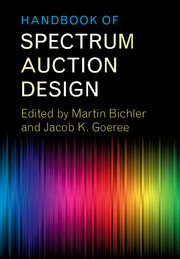Book contents
- Frontmatter
- Contents
- List of Contributors
- Preface
- List of Papers
- Part I The Simultaneous Multiple-Round Auction
- Part II The Combinatorial Clock Auction Designs
- 5 Combinatorial Auction Design
- 6 The Clock-Proxy Auction: A Practical Combinatorial Auction Design
- 7 Spectrum Auction Design
- 8 A Practical Guide to the Combinatorial Clock Auction
- 9 Market Design and the Evolution of the Combinatorial Clock Auction
- 10 Quadratic Core-Selecting Payment Rules for Combinatorial Auctions
- 11 Core-Selecting Package Auctions
- 12 A New Payment Rule for Core-Selecting Package Auctions
- 13 On the Impossibility of Core-Selecting Auctions
- 14 Ascending Combinatorial Auctions with Risk Averse Bidders
- 15 Properties of the Combinatorial Clock Auction
- 16 Budget Constraints in Combinatorial Clock Auctions
- 17 (Un)expected Bidder Behavior in Spectrum Auctions: About Inconsistent Bidding and its Impact on Efficiency in the Combinatorial Clock Auction
- Part III Alternative Auction Designs
- Part IV Experimental Comparisons of Auction Designs
- Part V The Bidders’ Perspective
- Part VI Secondary Markets and Exchanges
- Outlook
- References
13 - On the Impossibility of Core-Selecting Auctions
from Part II - The Combinatorial Clock Auction Designs
Published online by Cambridge University Press: 26 October 2017
- Frontmatter
- Contents
- List of Contributors
- Preface
- List of Papers
- Part I The Simultaneous Multiple-Round Auction
- Part II The Combinatorial Clock Auction Designs
- 5 Combinatorial Auction Design
- 6 The Clock-Proxy Auction: A Practical Combinatorial Auction Design
- 7 Spectrum Auction Design
- 8 A Practical Guide to the Combinatorial Clock Auction
- 9 Market Design and the Evolution of the Combinatorial Clock Auction
- 10 Quadratic Core-Selecting Payment Rules for Combinatorial Auctions
- 11 Core-Selecting Package Auctions
- 12 A New Payment Rule for Core-Selecting Package Auctions
- 13 On the Impossibility of Core-Selecting Auctions
- 14 Ascending Combinatorial Auctions with Risk Averse Bidders
- 15 Properties of the Combinatorial Clock Auction
- 16 Budget Constraints in Combinatorial Clock Auctions
- 17 (Un)expected Bidder Behavior in Spectrum Auctions: About Inconsistent Bidding and its Impact on Efficiency in the Combinatorial Clock Auction
- Part III Alternative Auction Designs
- Part IV Experimental Comparisons of Auction Designs
- Part V The Bidders’ Perspective
- Part VI Secondary Markets and Exchanges
- Outlook
- References
Summary
Introduction
Practical auction design is often complicated by institutional details and legal or political constraints. For example, using bidder-specific bidding credits or reserve prices may be considered discriminatory and unlawful in some countries making it impossible to implement an optimal auction design. More generally, the use of sizeable reserve prices may cause political stress due to the fear that it slows down technological progress when licenses remain unsold. While constraints of this nature are common and important in practice, mechanism design theory has typically treated them as secondary to incentive constraints.
Recent work by Day and Raghavan (2007), Day and Milgrom (2008), and Day and Cramton (2008) breaks with this tradition and asks how close incentive constraints can be approximated if other (institutional or political) constraints are put first. In particular, these authors have proposed an alternative payment rule to fix some drawbacks of the well-known Vickrey-Clarke-Groves mechanism, or “Vickrey auction” for short. When goods are substitutes the Vickrey auction produces an outcome, i.e. an allocation and payoffs for the seller and bidders, that is in the core. However, when goods are complements, the Vickrey outcome, while efficient, is not necessarily in the core and seller revenue can be very low as a result. Furthermore, non-core outcomes are “unfair” in that there are bidders willing to pay more than the winners’ payments, which makes the auction vulnerable to defections as the seller can attract better offers afterwards. The low revenue, perceived unfairness, and instability of Vickrey outcomes can create legal and political problems, which the alternative payment rule seeks to avoid.
The types of auctions proposed by Day et al. employ a payment rule that insures that outcomes are in the core with respect to reported values, i.e. the final allocation maximizes the total reported value and no coalition of bidders can block the outcome with respect to bidders’ reports. Unless reported values are always truthful, however, it does not imply that core outcomes are produced with respect to bidders’ true preferences.
Information
- Type
- Chapter
- Information
- Handbook of Spectrum Auction Design , pp. 253 - 263Publisher: Cambridge University PressPrint publication year: 2017
